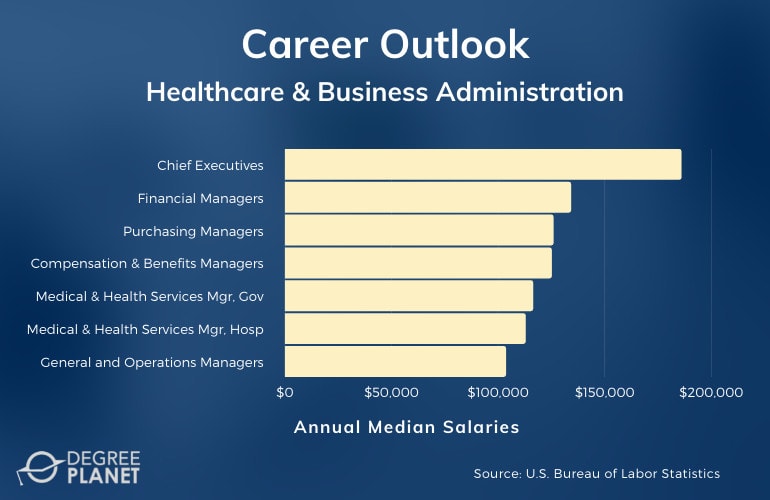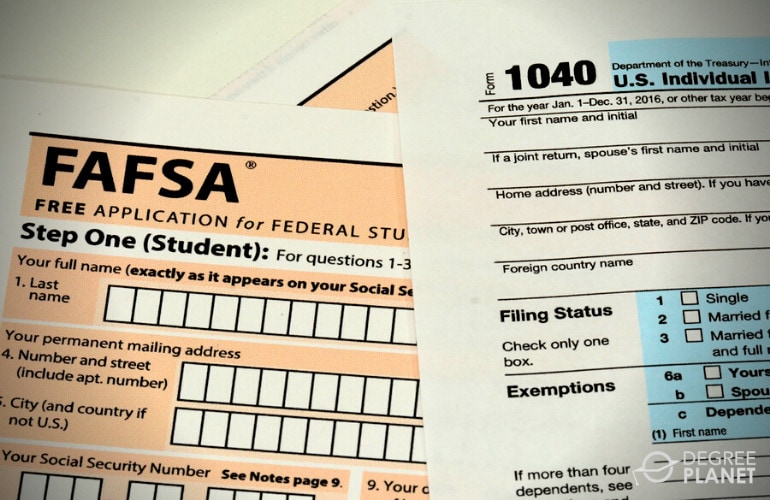MBA / MHA dual degree programs offer you the unique opportunity to combine MBA and MHA courses, get access to faculty in both disciplines, and earn two masters degrees at the same time.

If you’re interested in healthcare administration, pairing an MHA with a Master of Business Administration can help you develop both versatile and specialized business skills.
Editorial Listing ShortCode:
Dual degree programs typically require more time than single-track programs, but they often allow you to earn two degrees in less time than it takes to earn two masters separately.
MBA & MHA Dual-Degree Programs

MBA and MHA degree programs share some similar concepts and topics, letting you study healthcare and business administration at the same time. But they can each offer some unique and compelling advantages.
- Master of Healthcare Administration: An MHA program teaches you about regulations, policies, and management challenges unique to the healthcare sector.
- Master of Business Administration: This masters program can allow you to get more versatile business training, including topics such as entrepreneurship and marketing.
Earning an MHA simultaneously with an MBA in a dual program can help you build a larger professional network and position yourself for roles in healthcare-related businesses or facilities.
Editorial Listing ShortCode:
You can also find a range of MBA/MHA dual master’s degree programs online and with on campus options.
Master of Business Administration

In addition to learning about fundamental business management and administration methods and practices, you might opt to specialize in a significant branch of business leadership. Common specializations include:
- Organizational leadership
- HR management
- Financial analysis
- Accounting and budgeting
- Marketing
- Logistics
- Project management
- Entrepreneurship
An MBA can help you develop general business leadership skills that are applicable to a wide range of industries.
Master of Health Administration

An MHA program can offer you specialized industry-specific healthcare leadership insights not covered in most MBA programs.
MHA programs are designed to teach you the knowledge and skills needed to be effective administrators in healthcare-related organizations. You’ll typically receive training in public administration concepts and methods not as likely to be covered in an MBA program.
MHA course programs often cover healthcare leadership methods directly related to complex organizations such as hospitals and healthcare facilities.
Healthcare & Business Administration Careers and Salaries

Professionals with MBA and MHA training, skills, and experience can work in many business and administration roles. It’s beneficial to think about what areas of specialization best match your professional interests in your dual program.
According to the Bureau of Labor Statistics, there are a number of business and health administration management and leadership opportunities.
| Careers | Annual Median Salaries |
| Chief Executives | $185,950 |
| Financial Managers | $134,180 |
| Purchasing Managers | $125,940 |
| Compensation and Benefits Managers | $125,130 |
| Medical and Health Services Managers, Government | $116,380 |
| Medical and Health Services Managers, Hospitals | $112,870 |
| General and Operations Managers | $103,650 |
| Medical and Health Services Managers, Outpatient Care Centers | $100,690 |
| Medical and Health Services Managers, Offices of Physicians | $94,240 |
| Medical and Health Services Managers, Nursing and Residential Care Facilities | $89,880 |
If you’re looking for career opportunities at the intersection of business and health administration, it can be strategic to enroll in a dual MHA MBA program. MHA/MBA graduates tend to pursue careers as medical and health services managers, depending on their areas of specialization.
Editorial Listing ShortCode:
Specializing in entrepreneurship, organizational leadership, business leadership, or marketing could be an additional way to take advantage of MBA courses while simultaneously earning an MHA.
MBA / Healthcare Administration Curriculum

In joint MBA MHA graduate programs, you’ll get exposure to courses in two highly complementary majors. Courses will vary by school, but you can expect some courses like these:
- Business Analytics: You’ll learn foundational concepts and methods for predictive analytics and for analyzing a range of financial and operational metrics.
- Fundamentals of Accounting: This course provides a basic understanding of key rules, methods, and controls related to business accounting.
- Organizational Leadership: You’ll learn about organizational psychology and frameworks that inform effective leadership practices for promoting a positive and productive organizational culture.
- Healthcare HR Management: This course examines methods, laws, policy designs, and challenges related to human resources management in healthcare-related organizations.
- Healthcare Economics: You’ll learn about the economic complexities of the healthcare field, including regulatory aspects of providing direct healthcare services and challenges related to complex insurance networks.
- Healthcare Law and Ethics: You’ll explore legal and ethical considerations related to organizational leadership, policymaking, and decision-making in the healthcare sector.
- Global Organizations: This course examines various management and organizational analysis challenges in the context of global business ventures.
- Healthcare Quality: You’ll learn about healthcare quality management and standards of practice, liability risk management, and quality assurance policymaking in the healthcare industry.
- Strategic Management: You’ll learn to apply business and management analytics and informed-decision-making methods in simulated management scenarios.
- Healthcare Services Models: This course provides a systematic overview of models and methods related to operational management in complex healthcare settings.
By taking courses for an MBA and MHA graduate program, you’ll get exposure to broader business administration topics as well as specialized courses on administration in the healthcare industry.
Joint Masters Admissions Requirements

Admissions requirements vary by school and the dual program that you are applying for. For some programs, you may need to navigate separate admissions requirements for each major. In general, though, dual MHA and MBA degrees have admissions requirements that include the following:
- Bachelor’s degree or equivalent
- GRE or GMAT test scores (only some graduate schools require them)
- Satisfactory GPA
- Professional resume or CV
- Letters of recommendation
Some health industry and business programs may require or prefer applicants to have relevant professional experiences or specific prerequisite coursework. This is much like the MBA and MSW dual degree programs that a growing number of universities offer. It’s helpful to look over the specific admissions requirements for the programs you’re most interested in.
Accreditation

A school’s accreditation status can be an important factor to consider as you explore online or in-person options for your dual MHA and MBA degrees.
Regional accreditation helps ensure that you’re receiving high quality training in your field as well as student services that are up to par. School and program accreditation can also be required for healthcare professionals to be eligible for licensing or certification. Accreditation can be a precondition for some forms of financial aid as well.
Editorial Listing ShortCode:
You can visit the Council for Higher Education Accreditation (CHEA) to learn more about accreditation or to find accredited schools.
Financial Aid and Scholarships

If you think graduate school is the right path forward for your education and career, financial aid can help qualifying dual degree students manage the upfront costs.
Financial aid opportunities include state and federal aid, need-based and merit-based scholarships, employer-based aid, and student loans. Terms of loan programs and other offers can vary, so it’s helpful to review aid offers before committing.
For need-based assistance, filling out the Free Application for Federal Student Aid (FAFSA) will help determine your eligibility.
Can I Get a Dual Master’s Degree?

Yes, you can pursue dual masters degrees. One popular combination for a dual degree program is to match practical MBA training with expertise in a complementary field, such as healthcare administration.
Applying for a dual degree program may involve some additional admissions requirements and an extra year or so of study when compared to a single-track degree. If you plan to earn two degrees, though, a dual degree graduate program can often save you time and money in comparison to earning two degrees separately.
Which Is Better, MBA or MHA?

An MHA program is designed to equip students for careers in administration and management in the healthcare industry, so it’s focus will be more specialized compared to an MBA program.
That said, it’s also possible to find MBA programs that offer a healthcare management specialization.
- Master of Healthcare Administration: MHA courses will explore healthcare-sector issues, policies, and laws. They will also focus on management concepts and methods directly applicable to the healthcare industry.
- Master of Business Administration: An MBA program offers broader exposure to fundamental business administration methods. It also includes some concepts and topics such as marketing that won’t get covered in a single-track MHA program.
If you’re already working in this profession and want a quick and intensive professional growth experience, an MHA can be a strategic degree path. An MBA program, on the other hand, can help you develop a more versatile skill set with more open-ended career options.
What Is an MBA Dual Degree?

An MBA dual degree program is designed to equip students with robust business administration training as well as professional expertise in a second field.
MBA dual degrees are common, likely because MBA training can be applied to so many professional settings. Some popular combinations pair an MBA with a Juris Doctor (JD), a Master of Education (MEd), a Doctor of Medicine (MD), a Master of Public Health (MPH), or a Master of Healthcare Administration (MHA).
Editorial Listing ShortCode:
One advantage of a MBA dual program is the ability to earn dual degrees in less time than it would take to earn both degrees separately.
What Can You Do with an MHA/MBA Dual Degree?

With an MHA/MBA dual degree, you could use your training to pursue careers in a range of administrative and leadership roles in a variety of industries.
Jobs in medical and healthcare services management can be lucrative, and they are forecast for exceptional growth over the next ten years, according to Bureau of Labor Statistics.
Professionals in the field with training in business or health administration also work as financial managers, management analysts, or social and community services managers. The Bureau of Labor Statistics anticipates faster than average growth in each of these occupations.
How Long Does It Take to Get an MHA-MBA Dual Degree Online?

MHA-MBA joint degree programs typically take 2.5 to 3 years to complete, depending on the university and your chosen specialty.
Some accelerated online business administration degrees paired with an MHA may make it possible to finish in less than 3 years with full-time study and shorter course terms. An internship or thesis requirement may add time to your graduate program. In general, a 36 credit masters program with no thesis requirement may be completed in 1 year with full-time, year-round study.
What’s the Difference Between an MBA vs. MHA Degree?
Both a Master of Business Administration and a Master of Healthcare Administration provide training in a range of business administration, decision-making, and organizational leadership skills.
The MHA degree, though, provides close study of issues and topics unique to the healthcare field.
| MBA | MHA |
|
|
The advantage of an MHA is developing specialized skills for jobs in the sector. An MBA MHA dual degree program offers the additional opportunity to train in more general MBA skills.
What’s the Difference Between an MPH vs. MHA Degree?
A Master of Health Administration (MHA) helps prepare you to lead and manage healthcare organizations. A Master of Public Health (MPH) focuses on public and community health science, policy, education, and interventions.
| MHA | MPH |
|
|
As you can see, an MHA relates more to administration and management skills, while an MPH is more about public health policies and the science of epidemiology.
Is a Dual MBA & MHA Degree Worth It?

Yes, a dual MBA & MHA degree is worth it for many professionals. A dual MBA/MHA program could help you develop both the general business knowledge and specialized training you need to get ahead in the lucrative, growing healthcare field.
Administrative or management roles can be found in nonprofit or for-profit healthcare organizations, including hospitals, medical services networks, clinics, and nursing or rehabilitation facilities.
Editorial Listing ShortCode:
Occupations that require administrative training include compensation and benefits managers, financial managers, budget analysts, and administrative services and facilities managers.
The Bureau of Labor Statistics projects that management occupations will experience 5% job growth over the next ten years. Medical and health services managers in particular are expected to have 32% job growth, which is much faster than the average for all occupations.
Universities Offering MBA/MHA Dual Degree Programs
Methodology: The following school list is in alphabetical order. To be included, a college or university must be regionally accredited and offer degree programs online, on campus, or in a hybrid format.

Baylor University offers a dual degree program for students interested in a Master of Business Administration and a Master of Healthcare Administration. The program can typically be completed in 5 semesters and includes a year of residency. Applicants must have a GPA of 3.0 and need to submit GRE and GMAT scores.
Baylor University is accredited by the Southern Association of Colleges and Schools Commission on Colleges.

Cornell University offers a dual degree program for students interested in obtaining a Master of Business Administration and a Master of Healthcare Administration. The program requires students to complete 90 credits. Applicants should have a GPA of 3.5 or higher and must submit GMAT or GRE scores.
Cornell University is accredited by the Middle States Commission on Higher Education.

Saint Louis University offers a dual degree program for those interested in obtaining a Master of Health Administration and a Master of Business Administration. The program can typically be completed in 2 years. Applicants must be accepted into both programs to be eligible for the dual degree program.
Saint Louis University is accredited by the Higher Learning Commission of the North Central Association of Colleges and Schools.

Trident University International offers a dual degree program for students pursuing a Master of Science in Health Administration to obtain a Master of Business Administration as well. The program requires 16 courses, including a dual degree capstone project. Applicants must have a GPA of 2.5 and need to submit all official transcripts.
Trident University International is accredited by the Higher Learning Commission.

Tulane University offers a joint degree program for students interested in obtaining a Master of Business Administration and a Master of Health Administration.
To graduate, dual degree students must complete 54 credits, 10 of which must be related to business and health care, and a 960 hour administrative residency. Applicants interested in the program must contact the School of Public Health and Tropical Medicine.
Tulane University is accredited by the Southern Association of Colleges and Schools Commission on Colleges.

The University of Detroit Mercy offers a dual degree program for a Master of Business Administration and a Master of Health Services Administration.
The courses are offered in the evenings at the Riverfront Campus. Applicants must submit official transcripts and a resume. GMAT scores are required unless they have a GPA of 3.0, 7 years of experience, or a graduate degree.
The University of Detroit Mercy is accredited by the Higher Learning Commission.

The University of Houston—Clear Lake offers a joint Master of Healthcare Administration and a Master of Business Administration program.
Each of the courses is 8 weeks long, and classes may be taken completely on campus or through a hybrid format. Applicants must have a GPA of 3.0 or higher, GMAT scores, 3 letters of recommendation, and a personal statement.
University of Houston-Clear Lake is accredited by the Southern Association of Colleges and Schools Commission on Colleges.

The University of Minnesota offers a dual degree program for students interested in obtaining both a Master of Health Administration and a Master of Business Administration.
The program requires 95 credits to graduate, with 53 credits dedicated to the MBA and 48 towards the MHA. Applicants must have a GPA of 3.0 or higher, submit 3 letters of recommendation, and complete an entrance exam.
The University of Minnesota is accredited by the Higher Learning Commission.

The University of North Carolina—Chapel Hill offers a dual degree program for those interested in receiving a Master of Health Administration and a Master of Business Administration.
The program requires 96 credit hours and can typically be completed in 3 years. Applicants must complete an online application and submit letters of recommendation and a resume.
The University of North Carolina – Chapel Hill is accredited by the Southern Association of Colleges and Schools Commission on Colleges.

Webster University offers a dual degree program for a Master of Business Administration and a Master of Health Administration. To graduate, dual degree students must complete 66 credit hours. Applicants must have a bachelor’s degree with a GPA of 3.0 or higher, a letter of recommendation, and a personal statement describing their career goals.
Webster University is accredited by the Higher Learning Commission.
Earning Your Joint MBA/MHA Degree Online

Both an MBA and an MHA degree can equip healthcare professionals with valuable management skills and methods. A dual MBA/MHA program can be a potent combination for applying business skills in the healthcare sector.
You’ll likely find both dual online MBA / online public health degree and in-person program options that fit your learning goals and preferences.
If you’re intrigued by the idea of earning two complementary degrees for enhanced training and expertise, you may want to check out the many joint MBA/MHA degree options offered by accredited schools.

